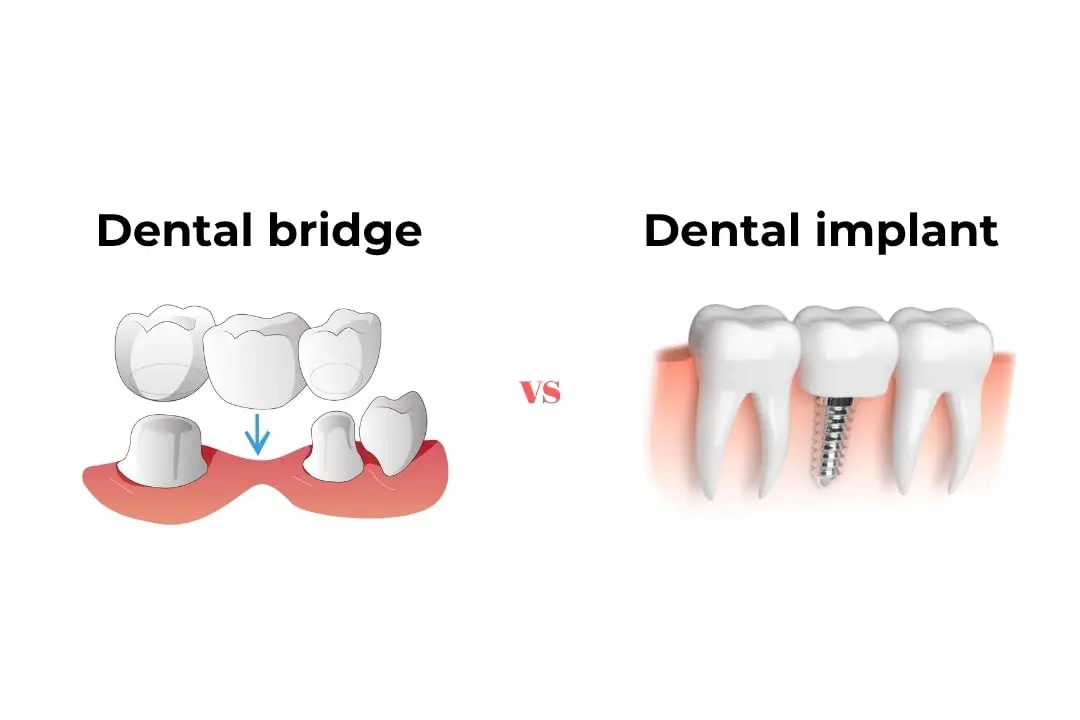
About dental bridges vs. implants
Missing teeth can cause problems both in terms of appearance and function. Your initial assessment with your dentist is the first step in determining the most suitable solution for you. Today, the most common methods for replacing missing teeth are dental implants and bridges. Both treatments can restore your natural smile and chewing function, but they are applied differently.
At Medical Dental Turkey, we have examined the pros and cons of each to help you find the perfect fit with the advice of our specialist dentists!
Dental implants
Dental implants are titanium posts that replace missing tooth roots. After healing, the surgeon inserts the screw-retained implant into the jawbone and places a crown on top. This method ensures the tooth feels as close to a real tooth as possible and remains in place. Implants are long-lasting because they integrate with the bone and do not damage the surrounding teeth. There are different types of dental implants, such as All on 4, All on 6, and full-mouth dental implants.
Dental bridges
The basic structure of a dental bridge consists of crowns placed on the natural teeth on either side of the missing tooth and an artificial tooth that fills the gap. The remaining false teeth, called pontics, are secured to the natural teeth with crowns. There are different types of dental bridges, including traditional bridges, cantilever bridges, and Maryland bridges.
Which is better for you?
There may not be a significant difference between implants and bridges in terms of daily life. Both provide basic chewing ability and are aesthetically pleasing. The appropriate approach depends on factors such as cost, treatment duration and ease, and personal preference. At Medical Dental Turkey, let's examine the pros and cons of dental implants and bridges to help you choose the right method for you:
Dental bridge vs. implant: Pros and Cons
Pros of dental bridges
- Provide a natural appearance when newly installed and fill gaps created by missing teeth.
- Maintain alignment of teeth by preventing neighbouring teeth from shifting.
- Restore chewing and speaking functions while protecting teeth health.
- Generally do not require bone grafting or invasive surgery, speeding up treatment.
- Installation usually completed in two visits spread over several weeks.
Cons of dental bridges
- Typically last 5–7 years; replacement may be necessary, though some can last over 10 years.
- Installation requires shaping adjacent teeth and placing crowns, potentially weakening healthy teeth and increasing cavity risk.
- Cleaning is more difficult compared to natural teeth. Special floss and tools may be needed to reach under the bridge.
- Can lose natural appearance over time due to changes in surrounding teeth.
Pros of dental implants:
- Visual results closest to natural teeth and maintain their natural appearance for much longer than bridges.
- Integrate with the jawbone, mimicking the tooth root, ensuring a secure placement. Implants can last a lifetime, though crowns typically last around 15 years.
- Fill gaps left by missing teeth, restoring chewing and speaking functions.
- Do not damage surrounding teeth and prevent shifting of neighbouring teeth, maintaining oral health.
- Decay-free and easy to maintain. Cleaning a single implant is simpler than a bridge, with a high long-term success rate (~97%).
Cons of dental implants
- Require surgical intervention in the jawbone, which carries risks such as infection, nerve damage, or incorrect placement.
- The procedure usually requires a healing period of more than six months and multiple clinic visits.
- Generally more expensive than bridges.
- Insurance coverage is often limited, making payment more difficult.
- Not suitable for people under 18 or with growing jaws, smokers, those who had radiation therapy to the jaw, or uncontrolled diabetes.
Dental implants or bridges? How do you choose the best option?
The best and most common ways to replace missing teeth are with dental implants and bridges. Cost, length of treatment, and maintenance needs are all important factors in deciding which method is best for you. But the best assessment should take into account your own needs and oral health.
When making a decision, it may be helpful to answer the following questions:
- How much time and effort can you dedicate to the treatment process?
- What is your comfort level with oral surgery?
- How much care can you afford for cleaning and maintenance?
- What are your budget and cost priorities?
The answers to these questions are individual, and there is no single solution that is right for everyone. Some people prefer long-term, natural-looking, and low-maintenance implants, while others may prefer faster and more cost-effective bridges.
Why should you choose Medical Dental Turkey for dental implants?
Medical Dental Turkey clinic is the address for quality and expertise in dental implant treatment in Antalya. Our experienced team provides sensitive and personalised care, taking into account the needs of each patient, ensuring you have a comfortable and safe implant experience.
The clinic uses the latest technology to plan each treatment specifically for you and carry it out with transparent processes. From the initial consultation to the final restoration, our team guides you step by step, making the treatment process comfortable and understandable.
Our dental clinic in Turkey not only gives you a beautiful and useful smile, but it also helps your teeth stay healthy for a long time and boosts your self-esteem. Take the first step towards a radiant and healthy smile with dental implants in Antalya by scheduling your consultation today.
